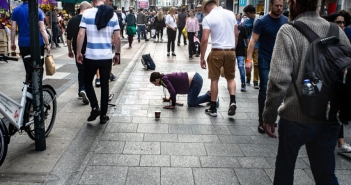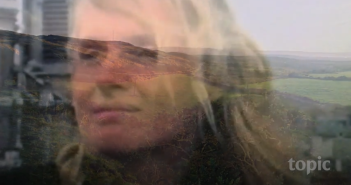I’m of an age to be intrigued by death.
My 84-year-old grandmother, widowed, came to live with our family, and took over my bedroom. I was forced to give up the room, to share instead with a sibling.
The old woman was hale and hearty, retained her wits, preserved her down to earth assessment of life, had referred to her late, much loved husband – my favourite male relation – as ‘the old fool.’ One day she said to me: ‘Ye’re just waiting for me to die, aren’t ye? Well yiz’ll be waiting a long time.’ I was taken aback at her frankness. She died a year later.
When my old friend Dinno was on his deathbed handled matter-of-factly by his ex-nurse wife Oonagh – I asked him what he was thinking of. He said: ‘Gone-ness. I’m wondering what gone-ness will be like,’ and did not need to elaborate. We had understood each other well.
My father roared indignantly on his deathbed in the old Mater hospital. His wife and other children had gone home, reassured that he had survived the first heart attack and would survive until morning. I stayed and was the only witness to his last belligerent protest.
My mother spent her last days carefully organising her own funeral and the disposal of her one asset (a house). She waited only for my return from Canada until, in my presence she removed the oxygen mask from her mouth and stopped gasping for breath.
I am of an age to be intrigued by these quite normal dramas. Love dies. Beauty dies. Everybody and every thing dies. As Woody Allen said: ‘I’m not afraid of death. I just don’t want to be there when it happens.’
What he might have meant was: better to lose your mind before your body gives up.
Dementia and altzheimers are tragedy for the nearest and dearest but a blessing for the sufferers because they don’t suffer at all; they are unaware of the impending disaster. What a way to go!
One of my brothers died in that condition. I envied him. One of my sisters died, still worrying about it. Poor thing. Another sister, the eldest in the family, is fortunately still alive. She’s lucky too; has no idea whats going on around her, I think.
The phenomenon is an everyday one and still we wonder at it: In what sense are we alive one day and gone the next, vanished without trace? No body. No soul. All disappeared, remembered briefly, forgotten forever. How extraordinary. Even when we breed frantically, seeking immortality, knowing our seed will also die, we still do it, procreating, making stains on life, producing work, writing, building solid bridges and skyscrapers, empires. All made of dust. Even dinosaurs lived a million years and now are merely known as skeletons.
People invented the idea of heavenly immortality: wishful thinking. They even invented god. We are at heart optimists.
There is no sting in death without consciousness; and nobody knows yet of what precisely that consists of. Fortunately death can be simulated under the surgeons knife until we wake and are reminded by pain of what we have mindlessly endured. Think of that.
Some people choose euthanasia but that’s a sin, we’re warned. It’s a cop out. We should be allowed to enjoy this once in a life experience. It is unique to each of us, just like our birth, to be celebrated as a never-to-be-repeated exercise. We are born astride a grave with, not a silver spoon, but a shovel in our hands.
I once speculated that nobody dies. We are bundles of transformed energy – the frantic impulses of copulation when we are conceived. Food becomes our energy fuel. What happens this energy at the point of death? Energy cannot be destroyed, only transformed like breath into gas, into condensation, into water into ice into steam etc etc. So what happens to us – bundles of energy? My speculation involves the millions and billions of galaxies and further billions of stars in each galaxy. Each of us, I suggest, becomes a twinkling star in the endless infinity of the universe. There is room for everybody out there.
There’s a happy thought. Perish our tiny worries. We are immortal. We just leave our egos behind. And good riddance.
A number of chapters from Bob Quinn’s latest memoir A Monk Manqué, mixing moments of hilarity with profound statements on the state of the world, are available on Cassandra Voices.
Culchies – An Excerpt from A Monk Manqué
Last Days in RTÉ – ‘I have come to kill you’
The Conman and Correspondence with Kurt Vonnegut
Old Man Talk – ‘I used to ride young wans in here’
‘what a young girl in love will say to keep her man’




